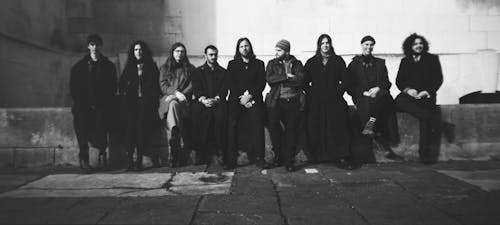Interview: Shovel Dance Collective and the ever-evolving nature of folk music
In a world where folk music is often seen as a relic of the past, the Shovel Dance Collective challenges this notion by embracing the ever-changing nature of the genre. The nine-piece folk band made up of musicians of mixed heritage was formed with a strong desire to bring the true essence of English language folk music to the public. Stripped of any pretence of "cleaning up" the narrative, or romanticising the lyrics, the band makes diversity their key point, and makes folk music a mutable entity. Their latest album, The Water is the Shovel of the Shore (2022), imbues traditional folk song with elements of layered sound textures of field recordings and free improvisation. Seeing folk music not as an archaeological artefact to be unearthed but as a living communal activity, their music invites listeners to embrace the mutability of traditional music, a genre that does not cling to the certainties of the past, but rather allows itself to be carried away by the mutability of the present.
Anticipating their performance at Rewire festival, in this interview the collective talks about the evolving sounds and practices in their music, their latest release, and the political aspect of folk music.
Traditional music has changed somewhat from how it was a hundred years ago, when many singers would begin each song by proclaiming how they’d learnt it from so-and-so at such-place over this-that-or-the-other amount of drinks. Of course, this way of songs being shared orally hasn’t entirely died out, but I sense that there is more of a – perhaps necessitated – “studied” approach among contemporary trad musicians. In your practices, how do you relate to the role of the researcher, the archivist, or the gatherer?
The folk music canon is a slippery thing. Much of what was once considered to be perfectly preserved, orally transmitted music turns out to be very much the opposite. Many of those who are responsible for this transformation – the researcher, archivist, gatherer that are mentioned in the question – probably influenced how we imagine the value in folk song, and who is or is not considered worth collecting a song from in the “folk” imaginary.
Many of the people these collectors visited with their tape recorders were fond of music hall songs, community songs, or songs we may now find deeply offensive. These songs often didn’t make it into the canon. The early collectors in England, such as Cecil Sharp, were driven by a quest for an authentically “English” culture, omitting songs that didn’t fit their ideal. Often they polished up overly sexual, rude, or rebellious lyrics. Sharp and others also drove a process of racialisation which erased the international and geographically fluid nature of folk song, particularly in their racist denial of the Blackness of “English” shanties. Before the revivalists, the folk song imaginary was always in a state of intertextual flux as many of our most beloved songs were produced in print as cheap entertainment or news media, often by professional or semi professional ballad writers.
It feels important to be conscious of these histories of collection and how they have inscribed certain prejudices and inequities into the ways in which we have received the songs – inequities which can be engaged with and fought. Though we don’t really have many people we could collect songs from in the same way anymore, we are taking part in a new stage of curation. That curation in some way is a vital part of our practice as Shovel Dance.
Any of us working in traditional music have to admit that we’re doing very much the same things as those collectors and ballad writers, just maybe with less of an intention to “neaten” the narrative. For us, as a band, we try not to subscribe to romantic notions of sourcing songs from unbroken lines of transmission but instead of mining what the song tells us about our commonality and the stories of regular people, the ways songs fall into the mouths of people. These can be embellished but – crucially – largely are done so by our own hands.
The ways people have latched onto and repeated songs has never really changed. Mistake making, misinterpretation, and productive intertextuality are all a massive part of our practice. We like what the songs and tunes say, how they sound, and, indeed, how they could sound. We are collectors in a sense, but also transformers and recontextualisers. Maybe everyone who falls in love with a song and sings it in the shower is a song collector. Traditional music is messy and we’d rather not pretend it’s anything else.

Your recent album, The Water Is The Shovel Of The Shore (2022), explored the relationships in folksong between a people and the waters that surround them. Perhaps, following on from the last question, how does a thematic approach affect what you decide to put together in an album?
When The Water is the Shovel of the Shore was mooted it felt so self-evident, the plan was immediately in action. There is an overwhelmingly large volume of traditional music related to water and we also live in such close proximity to such an interesting body of it – the River Thames. With this, combined with rich histories present on the water – both the liberatory and the colonial – the jigsaw really fell into place. We don’t feel like we’ve been working with any super tight concepts recently, although we always have more abstract shared understandings about what to play together anyway. It’s hard to shake off the water though, we still find ourselves singing about the sea a lot.
What kind of concepts or themes are you currently interested in which might inform what comes next?
We’re at a bit of a crossroads, arranging new music and following the string of the source material as it goes. We’re working with a few songs that have never or hardly ever been recorded and thus have very little reference points, which is a good thing we reckon. There’s also a lot of stitching together (horizontal) and layering on top (vertical) going on – so the crossroads analogy works well in terms of the two dimensions we are pulling.
We're still working in quite longform composition, and have been doing a lot of building up and then destroying different textures, musically speaking. We generally take a long time arranging and establishing themes and concepts fully (or the “right”' amount of time in our view). It seems we are thinking less about thematic frameworks like “water,” and more about both the methodological and conceptual bridges between us, the music, and our arrangements. There’s a future-looking interest in discovering how to record our new music and how to integrate our experiments in field recording, extended technique, and tape recording even more into our studio recordings. Exploration is the current theme, maybe.
You’ve spoken in the past about the importance of staying true to the working-class histories imbued in traditional music. What kind of social or political qualities are inherent to trad music, and how might they be better championed or remembered in contemporary times?
Scholars and collectors have always emphasised folk songs as those of working-class people. Much of the work of preservation has come from a fear that it – and the kind of work it depicts – are at risk of extinction. Whether these be rural songs in the first wave, or industrial songs in the second, the aim has been (for differing reasons) to preserve these forms before they leave us.
Work has changed a lot in the past couple of hundred years, we are a people more divided and further from those “traditional” class formations than ever before. New forms of work can often seem to erode concepts of solidarity and unity rather than uphold them; even though our shared oppression should push us so clearly towards our shared liberation from the chains of capitalism. Our repertoire, historically, spans the lifetime of capitalism and colonialism, so direct links can be drawn between the struggles of the people in the songs and our current situation. The songs also give us better ideas than many historical sources of what most people felt about major events, riots, heroic figures, etc.
The political value of folk music has always depended on who you asked, but for us, given the way society has been so divided – ultimately to the benefit of the ruling class – the importance of taking hold of folk music as being a kind of “commons” is ever more vital. It’s worth noting that folk music is not unto itself of a particular political colour, it has also been (occasionally) taken up by fascists as a route into understanding a twisted reading of indigeneity and nationhood. In this context it seems all the more important to emphasise the class origin of the music and claim it for the internationalist class struggle and a politics of liberation.
Traditional music is mostly about long dead people, in conditions we can only partly imagine. However, we can relate to these songs readily because the feelings they evoke still feel real, they feel human. The stories they tell are about the long struggle in all its forms: in defiance and defeat, to celebrate or to mourn. Folk music is useful for us as a collective and, indeed, on the left more widely, as it’s a medium that’s drawn from a shared political experience. Even though it’s often so specific in content it lives only in the moment it’s played, for the benefit of the people hearing it here and now.
Field-recording plays a prominent role in your music. Can you speak about the relationship you have with listening as a practice in the context of Shovel Dance Collective?
Field-recording, and more recently tape recording, have ended up quite organically playing a significant role in how we piece together all of our recently recorded music. Partly, we think that’s because of our attempt to emphasise the spatial nature of sound, and how traditional music is always walking this tightrope of feeling very tied to specific times and spaces whilst also having an incredibly inviting and generalised “human” (in the emotive sense) appeal.
We also tend to piece our recorded music together as a bit of a bricolage, partly due to us never having very consistent access to studio space, and also because we often find ourselves in interesting spots with Zoom recorders ready for guerilla recording sessions a lot of the time. Sometimes in the “doing” of recording everything becomes much clearer, and concepts build themselves rather than the other way around.
We wouldn’t really go through these elaborate processes of recording if we weren’t also obsessed with listening and recording-as-practise. Folk music is ultimately a transformational form, right, and so is recording. We’re always standing on the shoulders of giants in the world of traditional music, and the quality of archival recordings play such a part in how we understand older musical forms. Playing with layering spaces, different qualities, the inherent mistakes held in cassette tape recordings is all a part of this obsession, convening with ghosts somehow. We always talk about nonlinear time, and our music as palimpsest-like. Listening is the sense that I think lends itself most keenly to these time-based and multilayered concerns.
Listen to Offcuts and Oddities Vol. 2 on Bandcamp:
Shovel Dance Collective perform at Rewire 2024 on Sunday 7 April
Photo credits (from top to bottom): Kat Wood, Jordan Reyes & Sam Grassie
